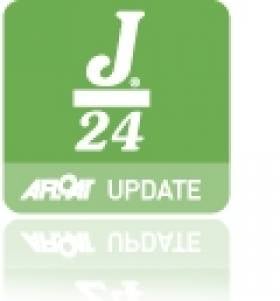Displaying items by tag: J.P. McCaldin
McCaldin Defending Title in Style
His championship defence couldn't have started any better, with three successive bullets. The fourth race was something of a disaster for them finishing 14th but 5th in the final race of the first day sees them two points clear of their major rival for the honours, Flor O'Driscoll (RSt.GYC) on 'Hard on Port' who notched up three third places and a win the final race to stay very much in touch with the defending champion.
Local hopes centre on 'Jibberish' (O'Kelly & Co) and they did not disappoint. Having only taken delivery of the boat two days ago after repairs to serious damage suffered months ago in a T-bone collision, they might be excused for not performing, as they got re-0acquainted with their boat. A results card that included two second places and the most impressive race win of the day – the margin of victory was very impressive – puts the Howth crew in third place overall going into the second day.
Tying on points but ranked as 4th is J/24 Class President Robin Eagleson of Lough Erne YC on 'Luder Too' who also showed great consistency with three second places and might have ended the day even higher up the leader-board if it wasn't for a disastrous last race when the tides played havoc with the distinctively red boat at the windward mark.
Two other northern boats – JP McCaldin's 'Jamais Encore' (Dalgety Bay SC) and 'Sayonara' (D.O'Donovan, LEYC) – fill the next two places overall.
The five windward-leeward races were sailed in varying (although generally fresh) conditions, with headsail changes the order of the day, while the last race threw up gusts of 30 knots plus at the 17-boat fleet. The series concludes on Sunday 12th with three races scheduled by PRO David Lovegrove and his team on 'Free Enterprise'.
J/24 National Championship – overall places after 5 races:
Mickey McCaldin – LEYC – 8 points
Flor O'Driscoll – RStGYC – 10 points
Fergus O'Kelly & Co. – HYC – 14 points
Robin Eagleson – LEYC – 14 points
J.P. McCaldin (DBSC) – 20 points
D.O'Donovan – LEYC – 20 points
Photo Gallery by Gareth Craig HERE





























































